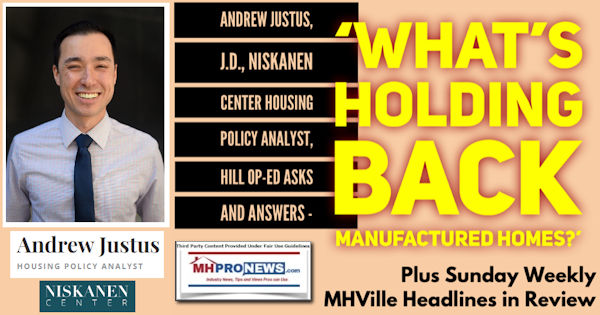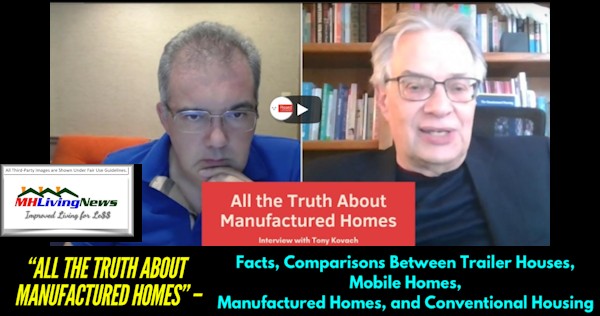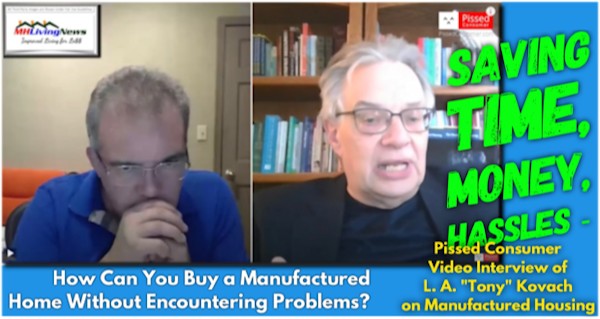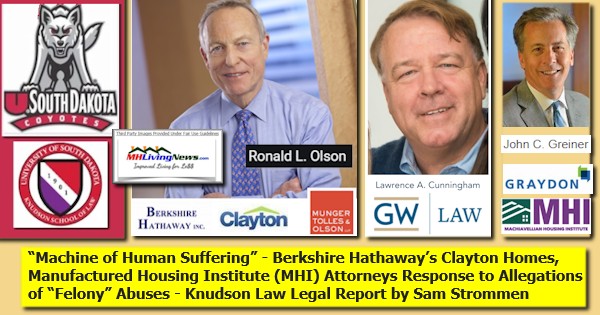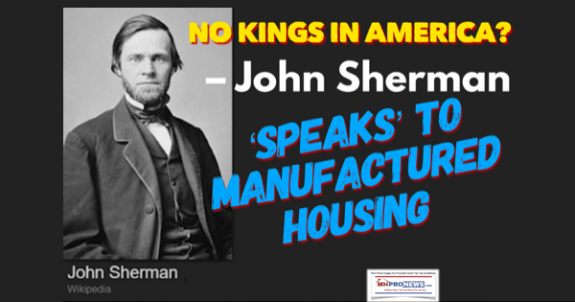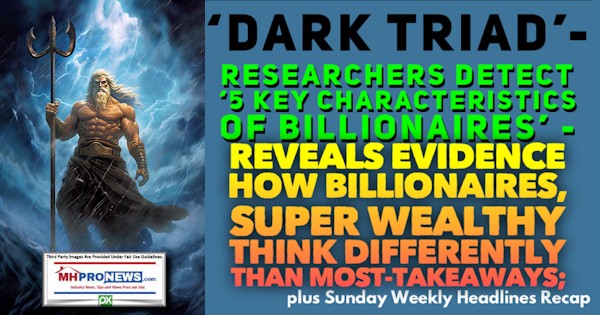
An article entitled “Core traits of BILLIONAIRES: Scientists identify 5 key characteristics” was published by the British Daily Mail and republished on MSN on 6.8.2023. Because they use “British English” that has some different spelling than is common in the U.S., that explains why some items that may appear to be a typo for an American is actually correct in England and is as found in the original. The Daily Mail said that “The study, conducted by researchers at the Open University and the Norwegian School of Management, accounted for numerous factors in daily life. Just over 3,200 participants were asked about their valuable physical possessions, property and other personal investments in the survey.”
- Psychologists examined the relationship between wealth and personality
- People with less money were found to be more neurotic and extraverted
The article by Lauren Haughey said: “viewers have been obsessed [for years] with the mega-rich yet miserable Roy family at the centre of the HBO series Succession, analysing the psychology and character traits of the narcissistic stars.
But is this a true depiction of billionaires?
Psychologists have examined the relationship between an individual’s wealth and personality traits to understand what it takes to be one of the wealthy elite.
Their findings identify five key characteristics in the super rich – do you have any of them?”
Here is the list, per Haughey and the Daily Mail.
FIVE TRAITS OF THE WEALTHY ELITE
- More conscientious with a greater sense of responsibility and organisation
- Less neurotic and unlikely to be impulsive when it comes to spending
- Less agreeable and less likely to overspend in generosity
- Less open to experiences and more tied down with property
- Less extraverted and more likely to make good investments
But what follows is perhaps as or more insightful.
“MailOnline asked psychologists to assess the dark personality traits of Logan and his children Shiv, Kendall, Roman and Connor. These traits, often known as the ‘Dark Triad‘, are psychopathy, narcissism, and Machiavellianism.” Logan and the children are characters in an HBO series Succession, but are considered as stand-ins for numbers (not all) billionaires.
Left-leaning Wikipedia says: “The dark triad is a psychological theory of personality, first published by Delroy L. Paulhus and Kevin M. Williams in 2002, that describes three notably offensive, but non-pathological personality types: Machiavellianism, sub-clinical narcissism, and sub-clinical psychopathy.”

Britannica, which often has a unique way of looking at the same or a similar topic as Wikipedia, said this about the dark triad: “dark triad, cluster of three negative personality traits—Machiavellianism and subclinical (nonpathological) narcissism and psychopathy—that share certain features, including emotional coldness, duplicity, and aggressiveness.”
Coldness. Duplicity. Aggressiveness. Machiavellianism. Narcissism. Psychopathy. Cold and aggressive are qualities and terms that most people grasp. Duplicity, perhaps less so, which is cause enough to see how Oxford Languages defines duplicity: “deceitfulness; double-dealing.”
Let’s run through the next three terms.
- 1) Machiavellianism, per Wikipedia is explained as follows. “Machiavellianism is a personality trait centered on manipulativeness, callousness, and indifference to morality.”
- 2) Narcissism, per Oxford Languages, means: “selfishness, involving a sense of entitlement, a lack of empathy, and a need for admiration, as characterizing a personality type.”
- 3) The definition of psychopathy per the federal National Institutes of Health: “Psychopathy is a neuropsychiatric disorder marked by deficient emotional responses, lack of empathy, and poor behavioral controls, commonly resulting in persistent antisocial deviance and criminal behavior.”
So, with those definitions in hand, here is that list of qualities that researchers say billionaires may have again.
- 4) Coldness. Duplicity. Aggressiveness. Machiavellianism. Narcissism. Psychopathy.
How this Applies to Manufactured Housing
For years, MHProNews and MHLivingNews have steadily sounded the alarm about how the industry has been underperforming, and why there is evidence that the underperformance is not an accident. Rather, that underperformance is an apparent feature of a scheme that fits the Machiavellian, duplicitous and other “dark triad” or related characteristics common among billionaires, per researchers. But ironically, a billionaire with big investments into manufactured housing sheds light on that these notions. That would be something said by William “Bill” Gates III, Microsoft founder. Gates is a big investor in Berkshire Hathaway and has been a strategic ally of Warren Buffett in “philanthropy” via the Gates Foundation, which both have sat on that foundation’s board.
It is Gates who said the following about Buffett. Watch how this applies to the Dark Triad and related concerns noted above billionaires, above.
Per CNBC, with Bing AI chat pointing to other sources too, said the following: “I didn’t even want to meet Warren because I thought, ‘Hey this guy buys and sells things, and so he found imperfections in terms of markets, that’s not value added to society, that’s a zero-sum game that is almost parasitic.’ That was my view before I met him … he wasn’t going to tell me about inventing something,” Gates said at a conference. The federal Centers for Dieses Control (CDC) defines parasite like this: “A parasite is an organism that lives on or in a host and gets its food from or at the expense of its host.” Isn’t that what has been occurring in manufactured housing? Is manufactured housing being hollowed out from within as if parasites were feeding off the industry’s host body?
Instead of growing the manufactured housing (MH) industry, the manufactured home (MH) industry has shrunk since Buffett began to directly invest in manufactured housing since 2002 when he bought into failing Oakwood Homes. In 2003, Berkshire Hathaway purchased Clayton Homes in a fight Kevin Clayton called “ugly.”
Updated Graphic Below
Notice: the graphic below can be expanded to a larger size.
See the instructions below the graphic below or click the image and follow the prompts.
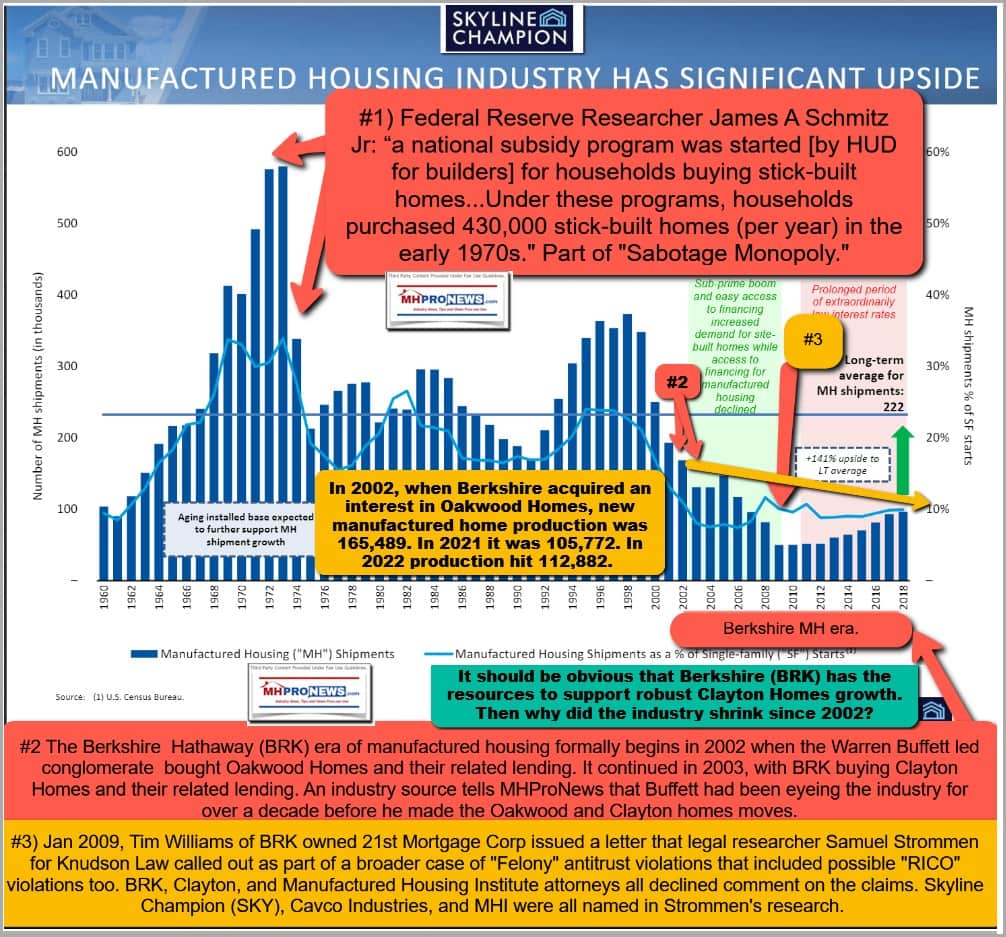
Clearly, Gates got over that arguably postured hesitancy mentioned in that CNBC quote above. Gates and Buffett have become obvious partners or allies in several ventures, including Berkshire and the Gates Foundation. Did Buffett change or did Gates embrace Buffet’s thinking? Or was Gates’ remark about Buffett all just Machiavellian story telling? Once more, that “dark triad” research say is common among billionaires includes:
- Coldness. Duplicity. Aggressiveness. Machiavellianism. Narcissism. Psychopathy.
A Bing search on 6.19.2023 on “The Buffett moat in manufactured housing” produced this result.

Notice: the graphic below can be expanded to a larger size.
See the instructions below the graphic below or click the image and follow the prompts.

That same search with Bing’s AI function produced this result.

Learn more:
- bing.com 2. manufacturedhomepronews.com 3. manufacturedhomelivingnews.com 4. manufacturedhomelivingnews.com 5. manufacturedhomepronews.com”
As a quick segue, these Bing searches make it clear that a leading source for research, reports and expert analysis into the Buffett moat concepts as they operate in the manufactured housing industry are found on MHProNews and MHLivingNews. But it isn’t just on manufactured home specific topics that our platforms rank highly in online searches.
This question was put to Bing’s AI Chat function: “what did the New York Times and the Washington Post say about Buffett’s remarks on Class Warfare?”

I hope this helps!
Learn more:
MHProNews is #3 in that Bing AI search result, even ahead of the giant Yahoo website.
One more question to Bing AI chat before a mini-summary. The inquiry was for: “Buffet the moat and monopoly” in the regular search there were over a million results, and MHProNews ranked at the end of page one, even though there was no mention of manufactured housing in the search inquiry. That said, here is what Bing’s AI reply was.

Is there anything else I can help you with?
Learn more:
Summing Up Before Pressing Deeper…
Buffett and Gates have been and remain among the world’s wealthiest billionaires who have been deeply involved through investments in the manufactured housing industry for years. In the case of Buffett, he’s had a direct involvement in manufactured housing for close to two decades. But an industry source deemed reliable has told MHProNews that Buffett has followed the manufactured housing industry since the 1980s. As a disclosure, this writer for MHProNews used to have a similar type of admiration for Buffett, or Sam Zell for that matter, as financial writer Robin Harding has described. A similar remark could be made regarding this writer and the Manufactured Housing Institute (MHI), as some articles posted during the Preserving Access to Manufactured Housing Act era (a decade or so ago) would reveal. As clear evidence for that prior ‘belief’ in Buffett and Zell, months before launching what was later rebranded as ManufacturedHomeProNews.com (MHProNews) one of the last articles I published via the now defunct Manufactured Home Merchandiser Magazine (MHMerchandiser) was to encourage industry professionals of the future of manufactured housing by saying that we could know the manufactured home industry would survive because of Buffett and Zell’s commitment to their respective parts of the business. In hindsight, based on years of new insights that article was sincere but naive, and I’d substantially re-write that article today. Because it should be clear that billionaires like Buffett or Zell had and their firms maintain the capability of advancing the manufactured housing industry in Washington, D.C., at the state, or local levels, through marketing, education, etc. But they have not done the obvious things to advance the industry – see a report on that linked in the recap of the headlines for the week below.
Restated, manufactured housing is dramatically underperforming in part because some large players in the industry quite obviously want the industry to underperform. If that seems counterintuitive, one must grasp the mindset of the billionaires, as the report cited above explained. For more on that see some of the reports for the week that was from MHARR and this publication further below.
My personal admission above may be useful and encouraging to those readers who may similarly have or do admire Buffett, Zell, or MHI. In my case, my ‘awakening’ to the difference between the projected image and reality included a series of tips, evidence, a period of sober reflection from a range of sources inside and outside of MHI. My harsh treatment at one point in time of MHARR’s prior leader and CEO, Danny Ghorbani, was born in part due to a kind of blindness to the illusions that people and entities are sometimes able to create. To better understand how false illusions can be created, see what Investopedia said about that topic in their recent report on the Illusory Truth Effect, which is unpacked in the reports for the week in review below.
It was over a period of months that became years of research that turned my understanding of the nature of Buffettism as expressed by Buffett and his circle – in and beyond manufactured housing – that were part of my awakening to the realities of manufactured housing. Those statements by Buffett and his allies including his remarks about monopolies and the moat. Paraphrasing what attorney and industry success story Marty Lavin, an MHI award winner who for some time has periodically issued various critiques against that national trade organization which he served for years observed: one should pay more attention to what people do rather than what they say. That’s cold, but coldness is also one of those “dark triad” traits that billionaires have.
That said, and pivoting back to the thrust of this article, in response to this search inquiry to Bing: “What did Warren Buffett say about monopolies?” were some of the following results.
The Seeking Alpha financial news and views site in a search about Buffett and Monopolies has this headline: “A Warren Buffett Insight: Buy Monopoly-Like Situations.”
Left-leaning The Nation has this headline: “Special Investigation: The Dirty Secret Behind Warren Buffett’s Billions.” MHProNews previously unpacked that report, because it specifically mentions Clayton Homes as an example of the Buffett moat tactics. Which begs the question, why didn’t all others in MHVille trade media publish a report and analysis on that same topic?

Business giant Forbes and The Nation are cited by Bing AI in this reply to that same inquiry.

I hope this helps. Let me know if you have any other questions.
Learn more:
A look at several of Buffett’s top 25 quotes on AZ Quotes appear to fit the profile that researchers cited at the top of this post cited about qualities of billionaires.
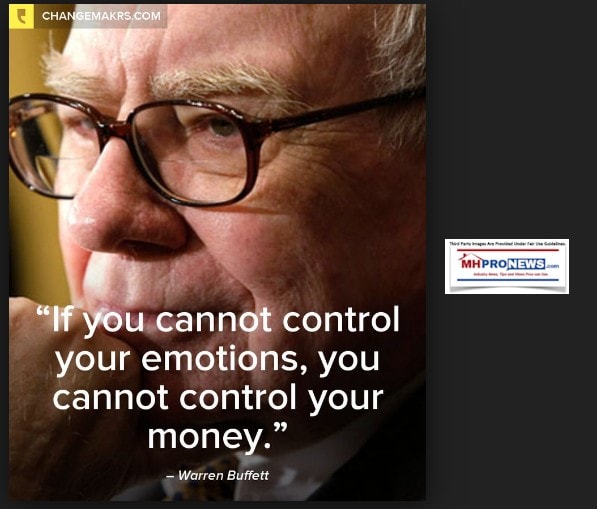
That said, per AZ Quotes is this remark of Buffett about monopolies:
- “If you’ve got a good enough business, if you have a monopoly newspaper, if you have a network television station – I’m talking of the past – you know, your idiot nephew could run it. And if you’ve got a really good business, it doesn’t make any difference.” – Warren Buffett
- “In business, I look for economic castles protected by unbreachable ‘moats.’ – Warren Buffett
- “The most important thing for me is figuring out how big of a moat there is around a business. What I love, of course, is a big castle and a big moat with piranhas and crocodiles.” – Warren Buffett per numerous websites.
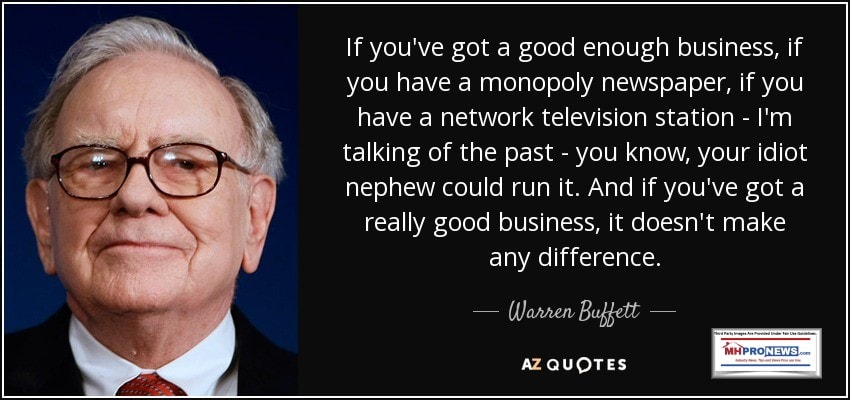
Now, go back to that list of qualities cited by the researchers above by the Daily Mail and this bulleted summary of it.
- Coldness. Duplicity. Aggressiveness. Machiavellianism. Narcissism. Psychopathy.
Buffett mentioned piranhas and crocodiles as part of his moat. Piranhas and crocodiles are man eaters. That’s cold and aggressive.
Perhaps to give antitrust enforcers a reason to look elsewhere, Buffett talks around monopoly with folksy sounding colloquialisms like “the moat.” That’s duplicity and Machiavellianism. Recall the research and remarks by Michael Lebowitz. Duplicity. Narcissism. Machiavellian.
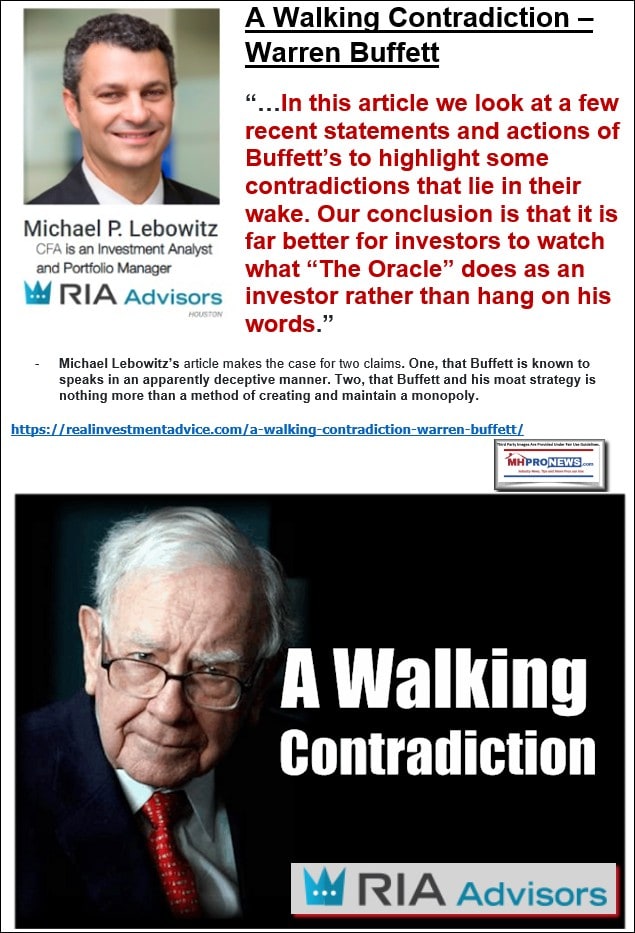
Recall that billionaire Nick Hanauer said being rapacious makes you a sociopath, and the researchers cited earlier described that as psychopathy.
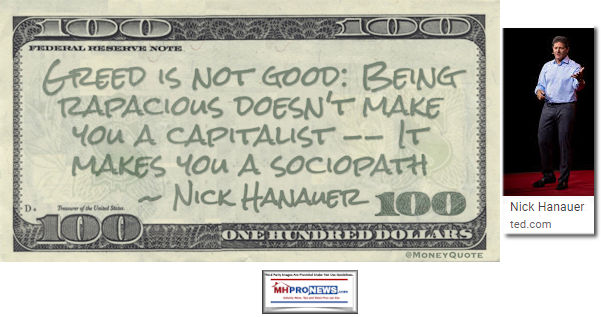
- Once someone grasps that some of the most influential people in manufactured housing are undermining the industry from within,
- and once someone understands that for them, this is a business model – while projecting something quite different to the public at large. That’s duplicity. That’s coldness. That’s Machiavellian. But that regrettably seems to be the pattern, as several articles for the week in review reflect.
Once more, it should not be thought that every wealthy person is automatically possessed by these dark triad traits. Each person should be judged on their own merits, behaviors and actions. But if the shoe fits, then someone should wear it, and others should be cautious of trusting them. Putting on a folksy or friendly veneer is apparently part of the ruse.
Because as the quotes and articles mentioned herein indicate, Buffett, his allies, and their disciples make it clear that they believe in moats that yield the results of having a monopoly.
And the reasons that monopolies are generally deemed illegal (at least by the letter of the law) in the U.S. and in numbers of other countries is because monopolies harm smaller businesses, they keep smaller businesses from emerging, and they thereby often harm the interests and choices of consumers. A lack of competition in a range of fields reportedly costs the average American some $5,000 annually, per the Biden White House in July 2021. See more on that in the reports for the week in review further below.
As the late Sam Zell stressed over a decade ago, in manufactured housing is of the oligopoly style. Buffett said he preaches the moat to his managers that they should expand their moat. Kevin Clayton made his firm’s use of the moat tactic clear in a softball video interview. Clayton says he took that heart and preaches it to his team in the manufactured housing industry field. Samuel Strommen’s research into MHVille, and the research by James A. Jim Schmitz Jr. of the Minneapolis Federal Reserve all fits the pattern that those ‘dark triad’ qualities explain. Their respective research in manufactured housing is linked in appropriate reports linked below.
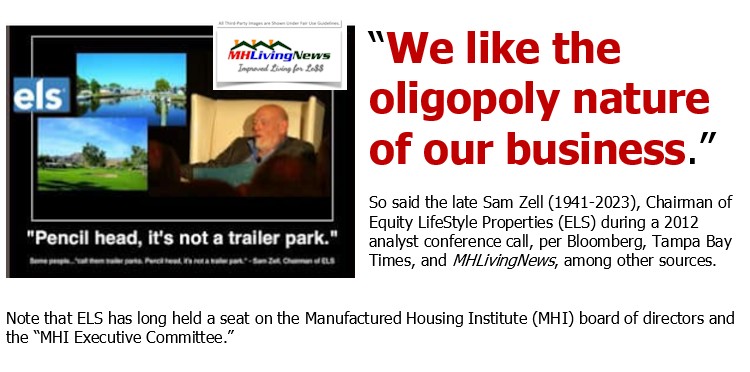
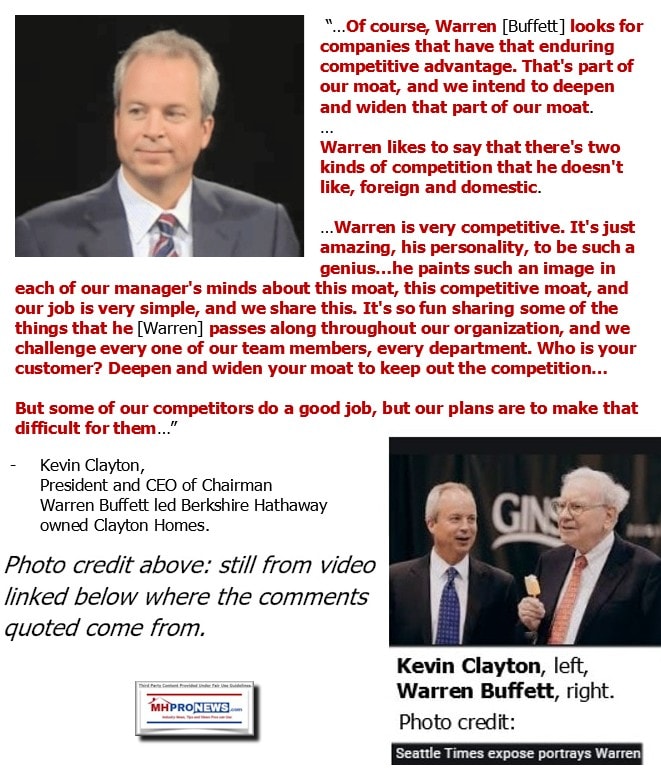
So, why is manufactured housing underperforming during an affordable housing crisis? One answer is this. Because that is how Buffett, Zell, Gates, Clayton, and those who are like minded have plainly said that they think. They may on occasion talk about industry growth, but the actions of MHI linked insiders speak louder than their words. Examples of it include the report below on Cavco Industries and analyst Greg Palm’s remarks to Cavco’s William “Bill” Boor.
With these insight, don’t miss today’s postscript, which will explore that in a message to Kevin and several other manufactured home industry leaders involved in MHI.
With no further adieu, the thoughts above are a fine lead into the headlines for the week that was from 6.4 to 6.11.2023.
What’s New from Washington, D.C. from MHARR
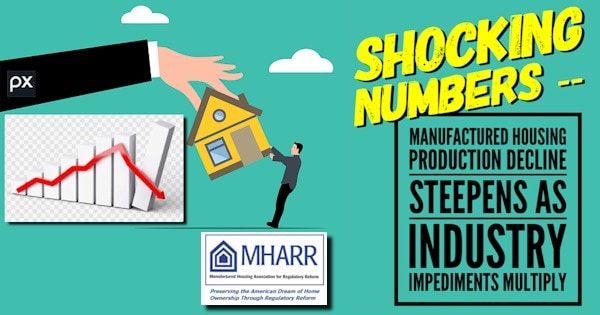
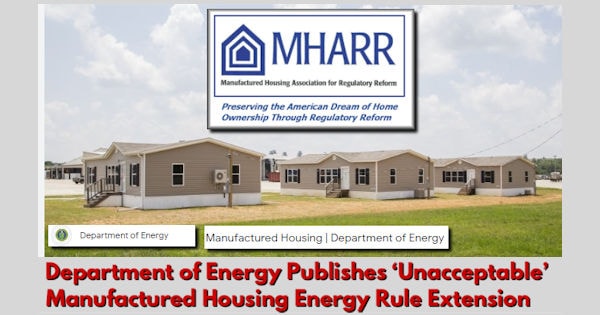
What’s New on the Masthead
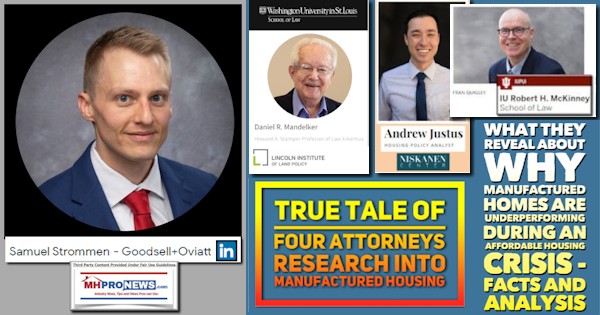
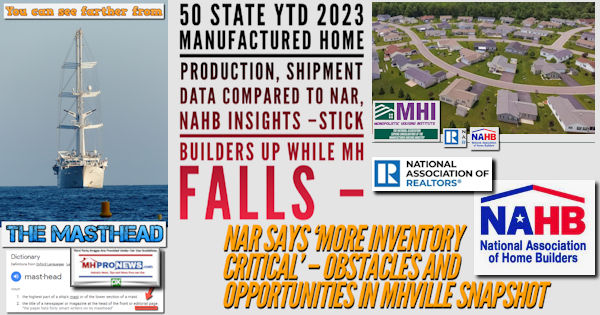
What’s New and Recent on MHLivingNews

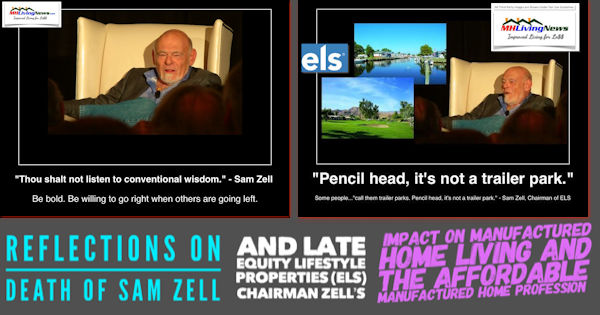

What’s New on the Daily Business News on MHProNews
Saturday 6.10.2023
Friday 6.9.2023
Thursday 6.8.2023
Wednesday 6.7.2023
Tuesday 6.5.2023
Monday 6.4.2023
Sunday 6.3.2023
Postscript – Inquiry to Kevin Clayton and MHI Board, Staff, Legal Leaders
The Society of Professional Journalism code of conduct encourages reaching out to those who are being critiqued. MHProNews periodically does so. In years past, prior to the ‘awakening’ described above, Manufactured Housing Institute (MHI) staff and corporate leaders would respond promptly. For a time after the awakening began, they would still respond. But over time that changed to no reply or no comment. That said, outreaches are still performed. Sometimes those outreaches are made with BCCs to others in the industry, which has several purposes that thinking people can intuitively grasp.
The emailed inquiry to the following professionals occurred on 6.9.2023. As of this writing, there have been several confirmations but no formal replies. The titles by the addressed parties name are added for the benefit of new readers or those who may need that added information.
| from: | L. A. Tony K latonyk@gmail.com | ||
| to: | William “Bill” Boor @cavco.com –Cavco Industries CEO and MHI Executive Committee Vice Chairman, Leo Poggione @forahouse.com – MHI Chairman who leads a unit reportedly owned by Cavco.Tom Hodges @claytonhomes.com – Clayton Homes General Counsel, prior MHI Chairman, Lesli Gooch @mfghome.org CEO of MHI. David Goch @wc-b.com – outside attorney for MHI,Mark Yost @championhomes.com – CEO of Skyline Champion and MHI board member, Kevin Clayton @claytonhomes.com – CEO of Clayton Homes, and prior MHI board member. |
Subject: MHI Leaders – Request for comments – BCCs to specific MHI members, federal officials, and other stakeholders
Manufactured Housing Institute (MHI) Board, Staff, and Legal Leaders,
In no particular order of importance, please email your responses to each of the following questions of concern thousands of manufactured home professionals and millions of affordable housing seekers.
1) MHI is obviously aware of the now seven (7) month downturn of new manufactured home production. During a recent earnings call, analyst Gregory Palm asked MHI Vice Chairman, and Cavco Industries CEO to explain why is manufactured housing production so weak? Andrew Justus, J.D., in an op-ed to the Hill asked the question, “What is Holding Manufactured Homes Back?” Why didn’t MHI directly address those issues in your communications with members and with the broader public? How can MHI influence public policy without specifically addressing obvious issues?
2) As you know, MHI recently issued an emailed document to the “Federated States” email list entitled “Changes Needed to Support Manufactured Housing.” MHI in general, and “MHI 2.0” current CEO Leslie Gooch in particular, is on record saying that “HUD should implement and enforce its enhanced preemption authority.” why is there no mention of getting HUD and/or members of Congress to fully and properly implement the so called federal “enhanced preemption” under the Manufactured Housing Improvement Act (MHIA) of 2000?
3) Similarly, why doesn’t MHI post its own emailed ‘news’ to its own website as the Manufactured Housing Association for Regulatory Reform (MHARR) does to their website? If the information is sincere and useful, then why not give it the maximum possible exposure?
4) If MHI is serious about getting “enhanced preemption” under the MHIA implemented, why is there no mention of those two words on the public side of the MHI website? Similarly, why doesn’t MHI uses that term – referred to by Kevin Clayton, Cavco’s Manuel “Manny” Santana, as well as Ms. Gooch among others – whenever you post on social media, or issue an op-ed or press release? Why hasn’t MHI pressed members of Congress to hold new hearings on the failure to fully and properly enforce the Manufactured Housing Improvement Act of 2000 – as occurred in 2011 and 2012?
5) In “Changes Needed to Support Manufactured Housing” there is no mention of the Duty to Serve Manufactured Housing (DTS) made law under the Housing and Economic Recover Act (HERA) of 2008. Ms. Gooch claimed that MHI was working for that effort. If so, then why did Tim Williams with 21st Mortgage, who is a prior MHI chair and has long been on the MHI board of directors, said he was “happy” that the GSEs pilot program failed? Why didn’t MHI join the coalition of nonprofits that included some MHI members to press FHFA to get Fannie Mae and Freddie Mac to launch a chattel loan program? Hasn’t CFED/Prosperity Now’s Doug Ryan largely been proven correct?
6) MHI finally acted by joining the Texas Manufactured Housing Association (TMHA) in a suit against the Department of Energy (DOE) to stop the implementation of an energy rule that your own attorneys argued would cause “irreparable harm.” Why isn’t MHI mimicking MHARR and the Wall Street Journal editorial and others by calling for “killing” the DOE energy rule entirely?
7) Now that MHI has enjoyed what some might think of as a modest measure of success by getting the DOE energy rule stalled, why doesn’t MHI deploy litigation to get HUD and the FHFA to follow the law on enhanced preemption and DTS? Why not join with MHARR to get Congress to hold hearings and act to see that those good laws are enforced so that manufactured housing can robustly grow again?
8) In the first part of 2023 three attorneys have raised issues that MHI says they care about.
- ‘Frustration and Hope’ – Law Prof Fran Quigley Slams Frank Rolfe and ‘Wall Street Holding a Gun to Mobile Home Residents’ Heads’ – Statements, Apt Manufactured Home Facts, and Expert Analysis Apparently, per sources, MHI has not acted against any of its own members who have apparently failed to uphold your own so-called Code of Ethical Conduct? If there has been any such action, please show evidence of it.
- Andrew Justus’s op-ed in The Hill begs for enhanced preemption to be deployed as a response, doesn’t it?
- Perhaps as or more embarrassing is the remarks by law professor Daniel R. Mandelker in a paper on barriers to manufactured housing argued starting is his abstract that: “A support organization is needed that can provide litigation and legislative support to help manufactured housing advocates with zoning reform. Statutory reform proposals for legislative change should be included in local zoning ordinances.”
9) To our knowledge, MHI has never responded to what attorney Samuel “Sam” Strommen evidence-based allegations in his Knudson Law paper that accused MHI and some of its leading brands of colluding to monopolize the manufactured housing market. Recall Strommen said the following.
“In the year 2000, Congress passed the Manufactured Housing Improvement Act.96 This act authorized “enhanced preemption,” which superseded all state and municipal standards, allowing manufacturers to deliver and install manufactured homes in separate jurisdictions provided they meet HUD standards.97 In 2008, the Federal Housing Financing Authority [FHFA], under the authority of the Housing and Economic Recovery Act of 2008, implemented an expanded Duty to Serve regulation, requiring Fannie Mae and Freddie Mac to facilitate home financing for very low-, low-, and moderate-income families.98 It should follow logically, then, that it should be cheaper and easier for residents of any state to finance and acquire a manufactured home. Unfortunately, this is not the case.”
That sounds like a different phrasing of what MHARR said earlier this week.
“There may be no greater indicator of collusion by the industry Big 3 through the MHI than HUD’s ongoing failure to implement enhanced preemption and for the [FHFA to compel the] GSEs to follow through on the Duty to Serve mandate. To call this ongoing failure a coincidence is a risible proposition: promotion of these runs contrary to the Big 3—and Clayton’s—interests in particular.”
“MHIs lobbying of the FHFA, or for that matter HUD, seems to invariably result in in policies that either benefit the Big 3, or at the very least, mitigate detriment. The outcome of these lobbying efforts is stultifying at best, and an abject failure at worst.”
Strommen accused MHI and some of it major brands of being guilty of apparent “felony” violations of federal antitrust laws.
Strommen said: “The author of this paper submits that the MHI’s conduct in obfuscation judicious decision-making by the [FHFA and HUD] constitutes a conspiracy to restrain trade under Section 1 of the Sherman Act, and by virtue of the misrepresentative nature of the conduct, should not be afforded Noerr protection.”
MHI has asked MHI corporate and staff leaders several times in recent years to explain the bizarre behavior if in fact MHI is seriously interested in robustly growing the industry as MHI leaders have claimed.
Isn’t Strommen correct in saying that MHI leaders are apparently interested in fostering consolidation?
There is more that could be said. But let me reiterate the offer for MHI leaders, individually or collectively, to respond to any of our articles on either ManufacturedHomeProNews.com or ManufacturedHomeLivingNews.com. If there are factual or logical errors, please point them out.
But absent that, based on what an attorney recently advised MHProNews – so long as a conspiracy is ongoing, then the elements of the conspiracy have not had the statues of limitations expire. For instance, the letter by Tim Williams in 2009, which Strommen referenced as an apparent antitrust violation, would still be actionable.
The late Sam Zell said it bluntly. He likes the oligopoly structure of the manufactured home industry. That, per sources, can be construed as evidence for intent to violate antitrust law and other laws.
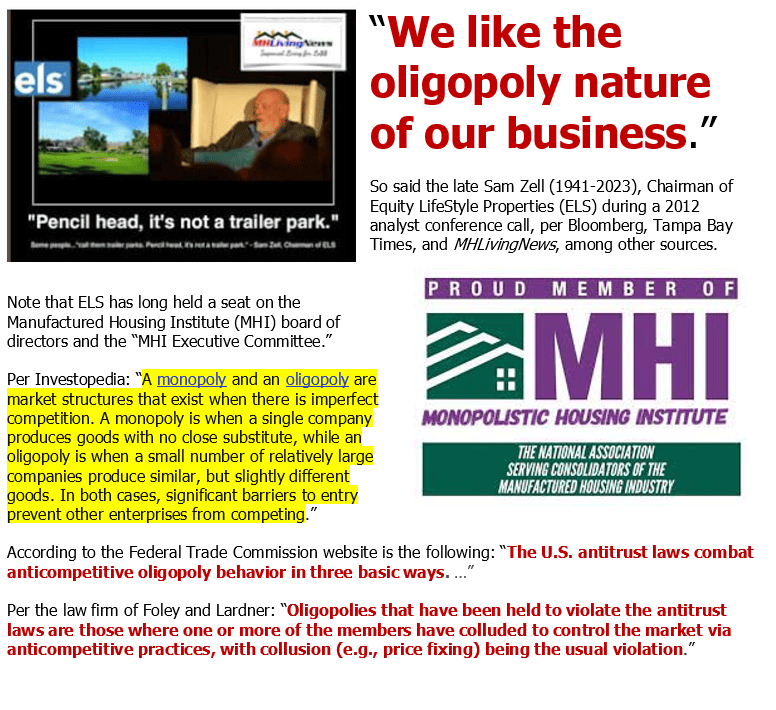
You know the drill. Please email your reply to each of the questions above. We plan to publish a report on Sunday. Should you not be able to meet that timeline for whatever reason, please feel free to respond next week.
Thank you.
Tony
##
As of 12:20 PM on 6.11.2023, about 45 hours after our initial outreach, there has been no direct reply. That means that the prima facie case against the personalities and firms named stands without response from those accused and is not being directly challenged. To learn more, see the new Masthead linked here. ###
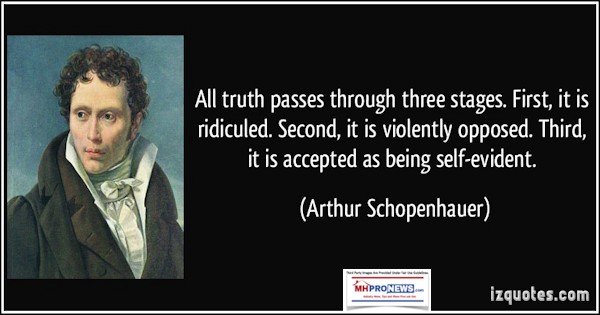
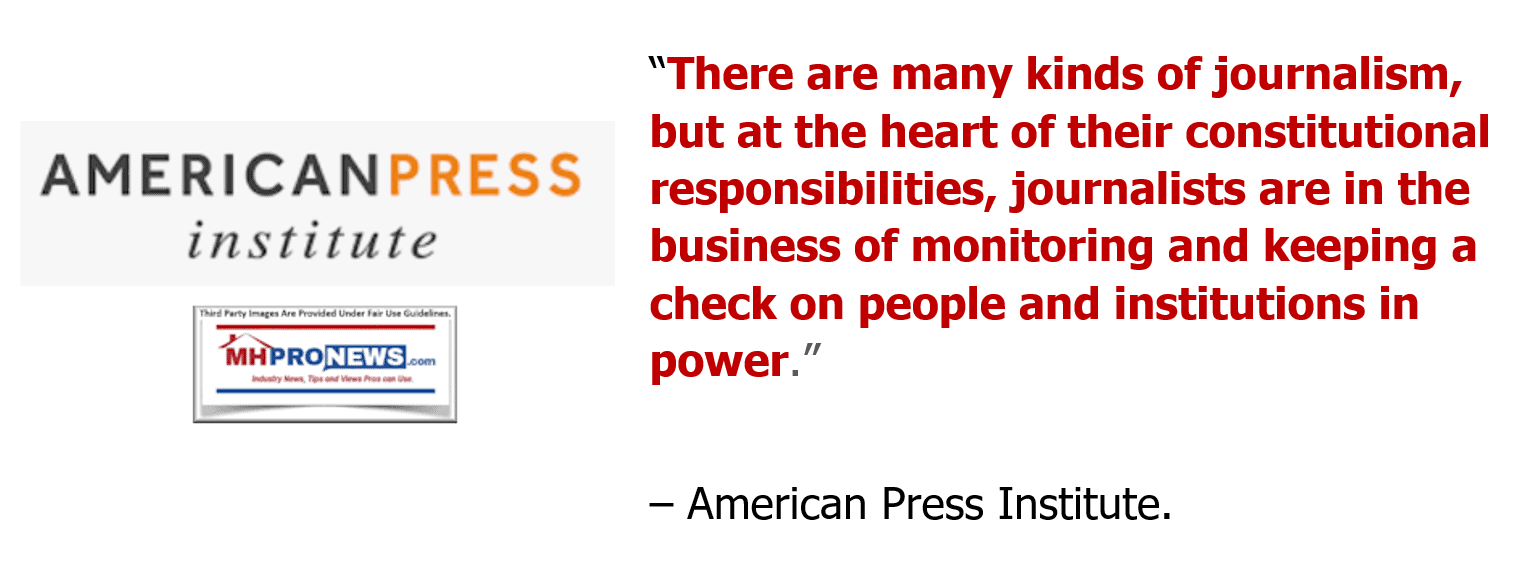


Again, our thanks to free email subscribers and all readers like you, as well as our tipsters/sources, sponsors and God for making and keeping us the runaway number one source for authentic “News through the lens of manufactured homes and factory-built housing” © where “We Provide, You Decide.” © ## (Affordable housing, manufactured homes, reports, fact-checks, analysis, and commentary. Third-party images or content are provided under fair use guidelines for media.) See Related Reports, further below. Text/image boxes often are hot-linked to other reports that can be access by clicking on them.)

By L.A. “Tony” Kovach – for MHProNews.com.
Tony earned a journalism scholarship and earned numerous awards in history and in manufactured housing.
For example, he earned the prestigious Lottinville Award in history from the University of Oklahoma, where he studied history and business management. He’s a managing member and co-founder of LifeStyle Factory Homes, LLC, the parent company to MHProNews, and MHLivingNews.com.
This article reflects the LLC’s and/or the writer’s position and may or may not reflect the views of sponsors or supporters.
Connect on LinkedIn: http://www.linkedin.com/in/latonykovach
Related References:
The text/image boxes below are linked to other reports, which can be accessed by clicking on them.’
